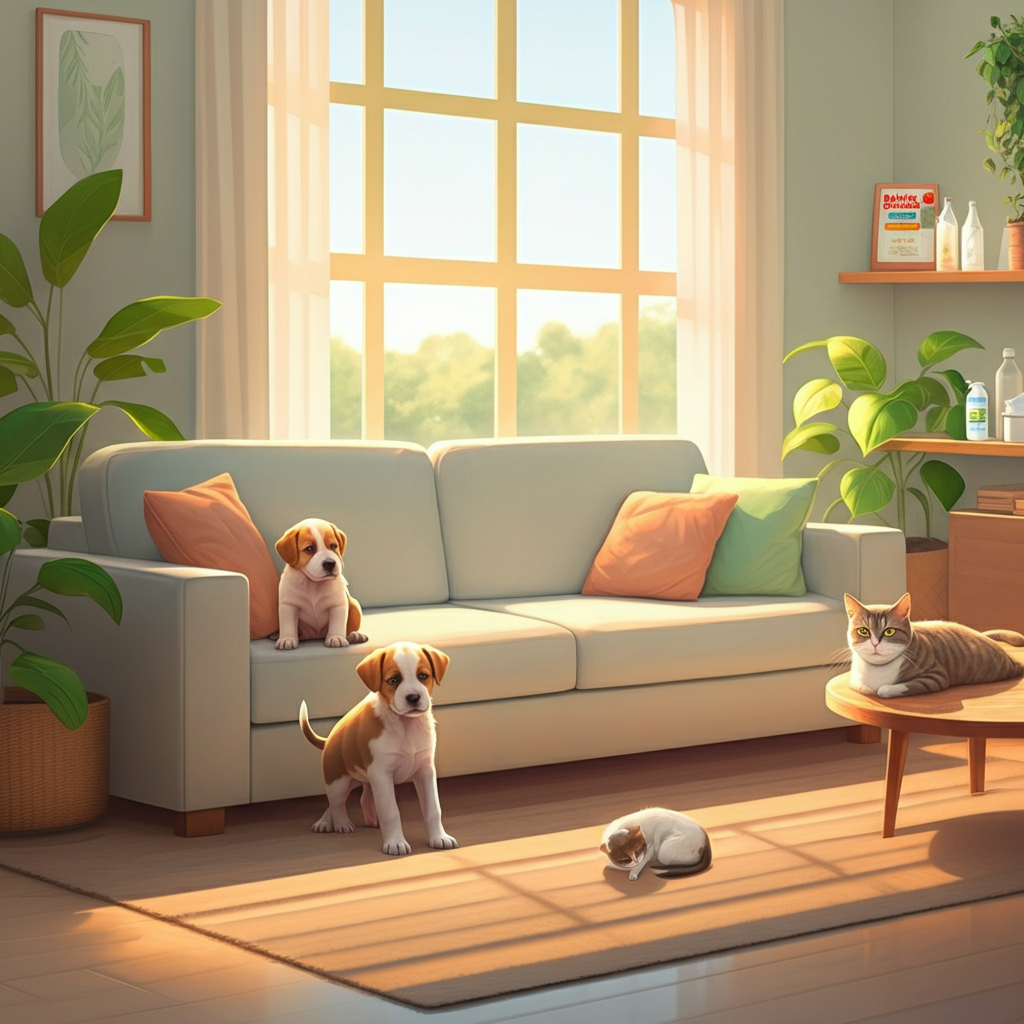Pets bring immense joy and companionship into our lives, yet their presence can introduce unwelcome scents. Whether lingering after mishaps or everyday pet smells, tackling odors is crucial for comfort as well as health. Since over two-thirds of American homes share their space with an animal, usually canines or felines, conquering pet odors is a widespread priority. This comprehensive manual provides actionable steps and remedies, ensuring your dwelling remains refreshingly fragrant regardless of residents with fur or feathers.
Comprehending the Composition of Pet Aromas
The Scientific Rationale Behind Pet Smells
Pet aromas signify more than an unpleasant sensation; certain compounds typically cause them:
- Ammonia: Found in pet urine, ammonia creates that sharp, biting scent which can persist if left untreated.
- Microbes: Areas of accident-prone activity may harbor microbes that break down organic matter and amplify disagreeable aromas.
- Additional Organic Compounds: Canine or feline fur, dander, and sweat glands also contribute to lingering smells, particularly in poorly ventilated spaces.
Prevalent Sources of Pet Aromas in the Domicile
- Carpets and Rugs: Trapped aromas from mishaps, fur, and dander.
- Furnishings and Upholstery: Absorptive materials can preserve scents for months.
- Pet Bedding: Regular wear and microbial activity, combined with saliva or fur, render pet bedding a prime culprit.
- Hardwood Floors: While less porous, fractures and joints can trap residues from accidents.
By understanding where aromas originate, you can target and eliminate them more proficiently.
Swift Actions
Expedient Cleaning Tips for Mishaps
When mishaps occur, acting promptly provides the best chance to reduce lingering aromas.
- Blot, Avoid Rubbing: Use paper towels or a clean cloth to blot up as much liquid as feasible. Rubbing can spread the stain.
- The nuanced approaches to neutralizing pungent pet pongs.
- Whether arising from accidents indoors or habitual outdoor activities, the odorous aftermaths of our furry friends demand delicate detangling.
Importance of Ventilation
While a breath of fresh air refreshes the home, proper ventilation prevents problematic pet odors. Here are simple strategies to improve indoor airflow:
- Open windows daily, circulating refreshing outdoor breezes throughout interior spaces. Opt for fans as well, directing circulated air towards areas retaining unpleasant scents.
- For those with furry friends indoors year-round, an air purifier equipped with a HEPA filter can extract odor particles, dander, and fur invisible to the naked eye.
Deep Cleaning Methods
Beyond Standard Surface Wiping
For bonded bacteria or deeply embedded odors, superficial cleaning proves futile. Two noteworthy deep cleaning techniques include:
- Steam cleaning harnesses the penetrating power of high heat vapor. With a satisfying hiss, steaming penetrates fibers to destroy malodorous microbes at their source, ensuring a truly deodorized dwelling.
- Just be certain to allow ample drying time post-cleaning. Those leaning dry may opt for specialized powders or foams, though with less intense results.
DIY Solutions Using Common Kitchen Staples
Expunging pet smells need not break the wallet. Household goods offer simple, cost-effective deodorizing solutions:
- Generously sprinkling baking soda overnight suffocates odors naturally as it neutralizes at a microscopic level.
- For portable freshening, white vinegar diluted with water maintains disinfecting properties when sprayed and blotted from fabrics
- . And for persistent stains, a gentle soap, water, and baking soda rinse extracts malodors while avoiding harsh chemicals.
Preventative Measures
Routine Grooming Is Key
Furry friends’ natural aromas originate on their coats. Frequent brushing and bathing cuts odors off at the source:
- Daily brushing removes loose fur and dander accumulating indoors before it manifests as smell.
- Bathing every 4-6 weeks (or as advised for the breed) with specialized pet shampoo containing odor-neutralizing ingredients keeps pets—and living spaces—fresh.
Choosing the Appropriate Pet Provisions
It is prudent to procure items that minimize malodors in the long run.
- Odor-Resistant Bedding: Fabric bedding constructed from materials impervious to smells or amenable to laundering is advised. When aromas accumulate, a thorough scrubbing is the solution.
- Premium Litter: Clumping litters and those imbued with odor-absorbers retain foul fragrances, sparing our nostrils. Regular dumping is a small task to keep the air fresh.
- Pet-Friendly Cleansers: Enzymatic cleansers tailored for pet odors are indispensable. With persistence, even engrained scents surrender to science.
When to Contact an Expert
If fragrances linger despite DIY campaigns, a professional touch may be necessary. Telltale signs include:
- Aromas outlasting multiple homemade remedies. Deeply embedded smells in carpets and cushions prove difficult for amateurs to vanquish.
- Homes requiring intense purification before sale or new inhabitants arrive.
Specialized Services
Several cleaning companies offer specialized therapies for pet scent removal including:
- Steam cleaning of rugs and coverings using pet-amenable solutions.
- Enzymatic treatments that permanently neutralize organic odors at their core.
- Ozone treatments that eliminate aromas at a molecular level, often deployed against severe cases.
- Thorough cleaning of upholstered items, ensuring even furniture is deodorized.
These services are worthwhile especially as pet scents can decrease a home’s perceived value by 5–10%, or so studies show.
Preserving a Fresh Atmosphere
Retaining a fresh-smelling home with pets doesn’t necessitate feeling perpetually defeated. By acting promptly, incorporating deep cleans into routines, and involving experts when necessary, you can appreciate pet companionship devoid of malodors. Regular grooming, DIY solutions, and optimizing air circulation are simple means to curb pet scents.
While most foul scents emanating from pets fail to fully dissipate, eliminating such odors is achievable through dedicated attempts. Consult a specialist service for a tailored plan to freshen living spaces, or carefully follow the DIY techniques outlined herein. With just a few judicious actions, owners and companions alike can soon enjoy surroundings smelling pleasantly anew once more.

